Alright, foodie quiz time! Quick—name the first three protein sources that pop into your mind. Got it? If you're like most, steak, chicken, or tofu probably made the cut.
But there's an unexpected contender nudging its way onto the list—a humble, earthy delight often hiding in the shadows. Yes, we're talking about... mushrooms!🍄
In a world that's becoming increasingly 'green,' where avocado toasts reign supreme and kale is the crowned king, plant-based diets aren't just a fad—they're a movement. And in this veggie-forward universe, the search is always on for the next big protein superstar.
Move over quinoa; could mushrooms be the next heavyweight champion in the protein arena? Buckle up because we're diving deep into the underbelly of this fascinating fungi world.
The Nutritional Powerhouse: Mushrooms
A Multivitamin in Fungi Form

Every time you munch on fresh mushrooms, you tap into an incredible reserve of health-boosting elements. Let's break it down.
Edible mushrooms are nature's multivitamin, brimming with many vitamins, minerals, and antioxidants. They're celebrated worldwide, not just for their delectable taste but also for the myriad health benefits of mushrooms.
Variety and Versatility

From shiitake to portobello, various types of mushrooms cater to different palates, but all bring something beneficial to the table. Beyond the well-known nutrients, mushrooms contain compounds(1) that can support your immune system and even boost brain health.
Protein Packed or Just a Myth?

But here's the juicy part—and the question that's probably brought you here: do mushrooms have protein?
You might have heard of steak and tofu being lauded as primary protein sources, but where do our fungi friends stand in this league?
Sure, when most of us think of mushroom protein, it's easy to get sidelined by their meaty texture and forget the actual numbers.
But it's not just about the texture. Mushrooms may surprise you with the amount of mushroom proteins they bring to the plate.Besides protein, raw mushrooms are a significant source of essential amino acids.
So, the next time you're considering eating raw mushrooms or sautéing or grilling those fresh mushrooms, remember you're not just enjoying a tasty treat but also tapping into a potentially potent source of protein.
The Protein Content: Numbers Don't Lie
If you've ever wondered, "Do mushrooms have protein?" or specifically, "How much protein do mushrooms have?" you're about to get your answers.
Let's journey through the protein landscape of some mushroom all-stars, proving that mushrooms are a good source of protein.
Portobello Mushrooms

The meaty delights of the fungi kingdom, often seen gracing burgers and grills, pack about 2.11 grams of protein per 100 grams (2). So, for those curious minds, yes, do portobello mushrooms have protein? Absolutely!
Shiitake Mushrooms

Frequently featured in Asian cuisine, these aren't just flavorsome; they're nutritious, boasting around 9.58 grams of protein for every 100 grams (3). And if you're scratching your head, wondering, do shiitake mushrooms have protein? – you bet they do!
Oyster Mushrooms

Often heralded for their delicate texture and interesting mushroom taste, but do they deliver on the protein front? With approximately 3.3 grams of protein in every 100 grams (4), the answer is: do oyster mushrooms have protein? Indeed, they stand their ground in the protein arena.
Cremini (or Baby Bella) Mushrooms

Portobellos's younger, more petite siblings offer a respectable 2.5 grams of protein per 100 grams (5). They might be small, but do baby bella mushrooms have protein? A resounding yes!
Enoki Mushrooms

These long-stemmed beauties might look delicate, but with about 2.66 grams of protein per 100 grams (6), they're no pushovers when it comes to nutrition.
Button Mushrooms

The commonly consumed mushrooms, be it fresh or as canned mushrooms, but don't let their commonality fool you. Packing roughly 2.89 grams of protein for every 100 grams (7), these little champs can hold their own when asked if mushrooms have a lot of protein.
Mushrooms vs. Other Protein Sources

Mushrooms might be a surprising protein contender, but how do they fare when compared with other veggies and plant-based sources?
Did you know a serving of Portobello mushrooms competes closely with an equivalent amount of spinach? When we think, "do mushrooms have protein in them?" and compare, it's clear: mushrooms are good.
Mushrooms are good not just for their protein content but for the slew of other health benefits. From boosting immunity to possibly having medicinal mushrooms properties, mushrooms contain a treasure trove of health perks.
Be it wild mushrooms you foraged from the forest floor, or canned mushrooms you picked up from your local store, the amount of protein and the health benefits of mushrooms are hard to overlook.
So, the next time someone asks, "do mushrooms have protein?" you can confidently nod and dive deep into the numbers.
Why Mushroom Protein Matters
The Protein Spectrum: Complete vs. Incomplete

First things first, when we ask, "do mushrooms have protein in them?" it's not just about the quantity but also the quality.
Proteins are made up of amino acids, the building blocks of life. Now, the human body requires certain essential amino acids that it can't produce alone. Many sources of protein, especially animal proteins, are "complete," meaning they contain all of these essential amino acids.
Edible mushrooms, while a delightful source of protein, are technically "incomplete." However, what they lack in completeness, they make up in other nutritional value. Specifically, many mushrooms are rich in certain essential amino acids, making them a valuable addition to any diet, especially a plant-based one.
Mushrooms and Muscle Synergy

Mushroom protein, mainly from fresh mushrooms, can play a role in muscle growth and repair. This is why some people use mushrooms like cordyceps pre-workout.
While they might not match the protein content of a steak per serving, they offer a protein-rich alternative without saturated fats and cholesterol.
Especially for those on a plant-based journey, incorporating fresh mushrooms offers a protein boost with added benefits of mushrooms, like fiber, vitamins, and bioactive compounds.
The Medicinal Bonus

Beyond the standard culinary mushrooms, there's a realm of medicinal and functional mushrooms. These mushrooms, spanning various mushroom species, not only offer numerous health benefits but also bring with them medicinal properties.
While the essential amino acids are the stars of the protein world, the bioactive compounds in these mushrooms play a crucial role in health, from boosting immunity to reducing inflammation.
Beyond Protein: Additional Health Perks
Micronutrient Goldmine

While many of us are getting enlightened on the protein realm of mushrooms, often asking, "do mushrooms have protein in them?" there's a whole universe of vitamins and minerals they bring to the table.
Yes, how much protein do mushrooms have is a valid question, but let's not stop there. Beyond being a modest protein source, mushrooms are a powerhouse of essential nutrients.
For starters, they're an excellent source of vitamin D, a rarity in the plant kingdom. The vitamin D in mushrooms is something that sets them apart.
Coupled with their ability to increase their vitamin D content when exposed to sunlight, these fungi wonders are true champions for bone health.
Nutritional Breakdown
Mushrooms are a rich source of dietary fiber, a boon for gut health, and essential B vitamins. The niacin vitamin content and vitamin B5 ensure that your body's energy production is on point. This means that mushrooms improve your gut health and go a step further to help you increase your energy.
Brain and Mood Boosters

Certain mushroom varieties stand out when diving deeper into the myriad of vitamins and minerals they offer.
These mushrooms shower you with essential vitamins and possess potential brain and mood-enhancing properties—a good example is the Lion's mane mushroom(8).
These mushrooms for brain health are potential allies for cognitive health and emotional well-being.
The Selenium Secret

Let's not forget about selenium, a mineral that mushrooms proudly flaunt. This is yet another feather in their cap, adding to their already impressive list of vitamins and minerals. Selenium plays a vital role in DNA synthesis and reproduction, protecting our body from infection and damage.
Making the Most of Mushroom Protein
Incorporating Mushrooms in Your Daily Diet

One of the best things about mushrooms, be it fresh mushrooms or medicinal mushrooms, is their versatility in the kitchen.
Looking for a low-calorie food with an explosive umami flavor? Look no further!
From sizzling stir-fries to fresh salads, mushrooms effortlessly enhance any dish. Slide them into your morning omelets or toss them into a stir fry for a protein boost, ensuring you reap all the health benefits they offer.
Tantalizing Mushroom Recipes

Ever tried swapping ground beef for cremini mushrooms in your burger? Not only do you get a delightful delicate flavor, but you also craft a burger that's a true meat substitute. This is an excellent strategy for replacing meat without compromising taste or texture.
Furthermore, with just 1 cup of mushrooms, a mushroom risotto can elevate your dinner game, balancing flavor and nutrition.
Or, if you're in the mood for something even more substantial, how about a protein-packed mushroom burger? With the umami flavor that mushrooms add, your tastebuds are in for a treat.
Mushroom Power in Powder Form

For those who're on the go, mushroom powder is the answer. How to use mushroom powder should not be a problem—this versatile form retains all the health benefits of medicinal mushrooms and can be easily sprinkled onto your meals or added to shakes. You can also use mushroom powder in your smoothies.
Ingesting this powder equates to a substantial dose of nutrition. Besides, certain dietary supplements now harness the power of mushroom powder to offer you complete proteins in every spoonful.
Selection, Storage, and Preparation

Knowing the nitty-gritty of mushrooms is essential to maximize the benefits. For example, when selecting cremini mushrooms, ensure they're firm to the touch.
As a low-calorie food, mushrooms are a great addition to a balanced diet, but their nutritional content can diminish if not stored correctly. Always store them in a cool, dry place. Before cooking, rinse them gently to maintain their integrity and ensure you get the best flavor and nutrition.
FAQs About "Do Mushrooms Have Protein?"
Can I Rely Solely On Mushrooms As My Primary Protein Source In A Vegetarian Or Vegan Diet?
While mushrooms offer a decent amount of protein, especially for a vegetable, they shouldn't be your sole or primary source of protein in a vegetarian or vegan diet.
Although they can complement a protein-rich diet, it's essential to diversify your sources to ensure you're getting all the necessary amino acids and a higher protein content. Combine mushrooms with legumes, grains, nuts, and seeds for a balanced and comprehensive protein intake.
How Does Cooking Affect The Protein Content In Mushrooms?
Cooking mushrooms can cause a slight reduction in their protein content due to the heat and moisture. However, the decrease isn't significant enough to deter you from enjoying cooked mushrooms.
Cooking can enhance flavor, make certain nutrients more bioavailable, and break down potentially harmful compounds. So, while it's true that raw mushrooms might retain slightly more protein, the benefits of cooking them often outweigh the minuscule loss of protein.
Are There Any Potential Side Effects To Consuming A Lot Of Mushrooms In My Diet?
While mushrooms are generally safe and beneficial for most people when consumed as part of a balanced diet, it's essential to consume them in moderation. Some individuals might experience digestive discomfort if they consume large quantities.
Additionally, ensure you're eating edible, non-toxic varieties. Wild mushrooms can be toxic and should be consumed with caution. Lastly, avoiding or limiting your intake if you have allergies or sensitivities to mushrooms is best.
Key Takeaways
So, there you have it! From the protein content to the tantalizing tastes and textures, mushrooms stand tall in the kingdom of nutritional dynamos.
They're not just a savory treat to tickle your palate but a veritable treasure trove of health benefits. Whether you're a committed carnivore, a voracious vegan, or somewhere in between, it's clear that mushrooms deserve a starring role on your plate. This is because Mushrooms are a good source of numerous nutrients your body needs to stay healthy.
As you embark on your culinary adventures, remember that every bite of mushroom delivers a protein punch and a symphony of vitamins, minerals, and unique benefits that few foods can match. So, the next time you ponder what to add to your stir-fry or salad, let the mighty mushroom be your muse.
Now, we're curious! How do you incorporate mushrooms into your meals? Any favorite recipes or preparation tips? Dive into the comments below and share your mushroom magic with our vibrant community. Together, we grow, learn, and savor the wonders of wellness.
References
- Immune Modulation From Five Major Mushrooms: Application to Integrative Oncology, (1), https://www.ncbi.nlm.nih.gov/pmc/articles/PMC4684115/
- Mushrooms, portabella, raw, (2), https://fdc.nal.usda.gov/fdc-app.html#/food-details/169255/nutrients
- Mushrooms, shiitake, dried, (3), https://fdc.nal.usda.gov/fdc-app.html#/food-details/168436/nutrients
- Mushrooms, oyster, raw, (4), https://fdc.nal.usda.gov/fdc-app.html#/food-details/168580/nutrients
- Mushrooms, brown, italian, or crimini, raw, (5), https://fdc.nal.usda.gov/fdc-app.html#/food-details/168434/nutrients
- Mushrooms, enoki, raw, (6), https://fdc.nal.usda.gov/fdc-app.html#/food-details/169382/nutrients
- Mushrooms, white button, (7), https://fdc.nal.usda.gov/fdc-app.html#/food-details/1999629/nutrients
- Neurotrophic properties of the Lion's mane medicinal mushroom, Hericium erinaceus (Higher Basidiomycetes) from Malaysia, (8), https://pubmed.ncbi.nlm.nih.gov/24266378/



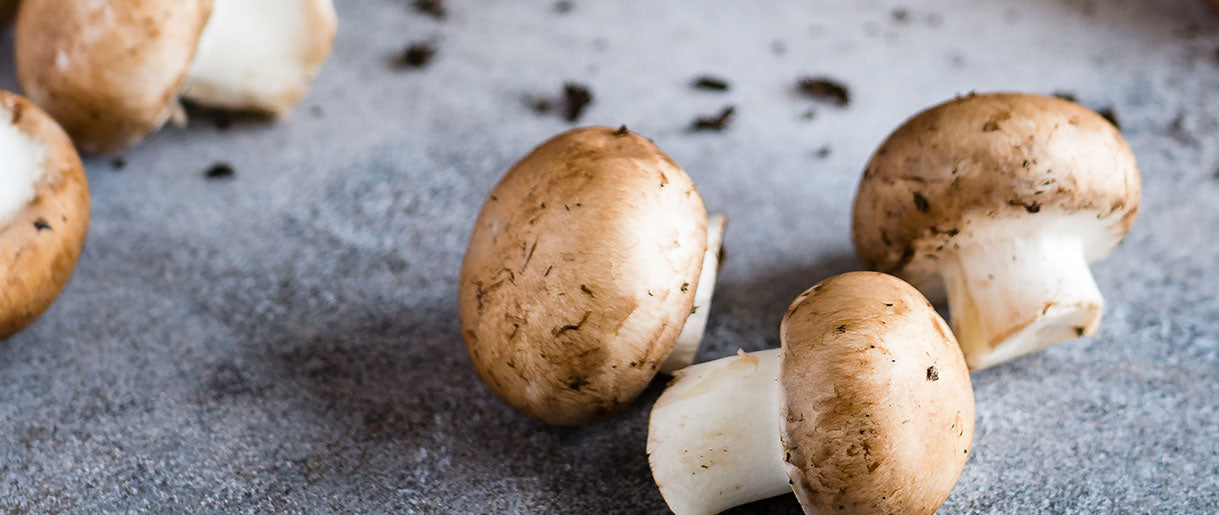

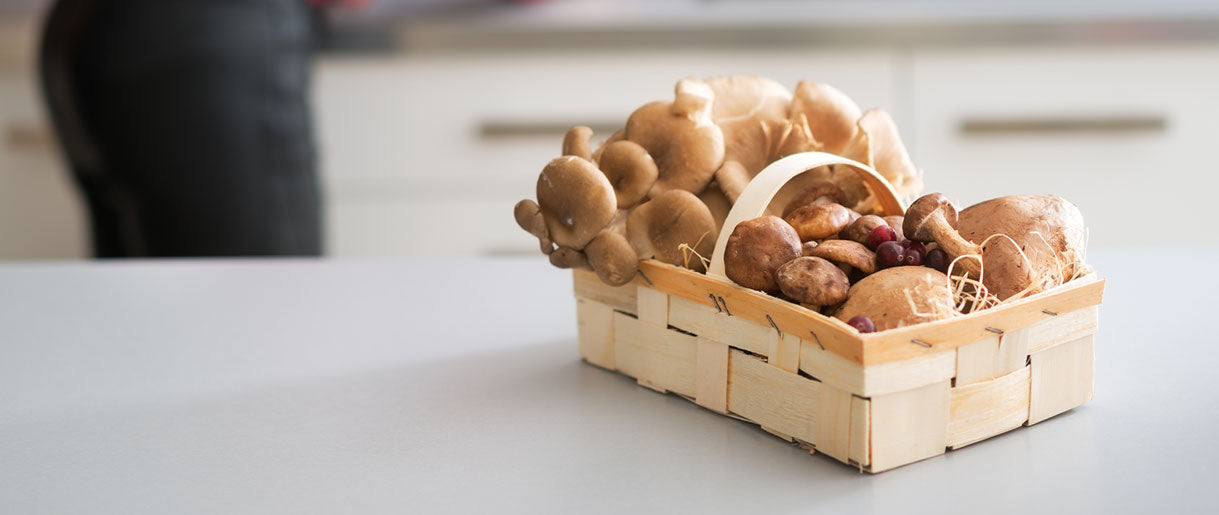
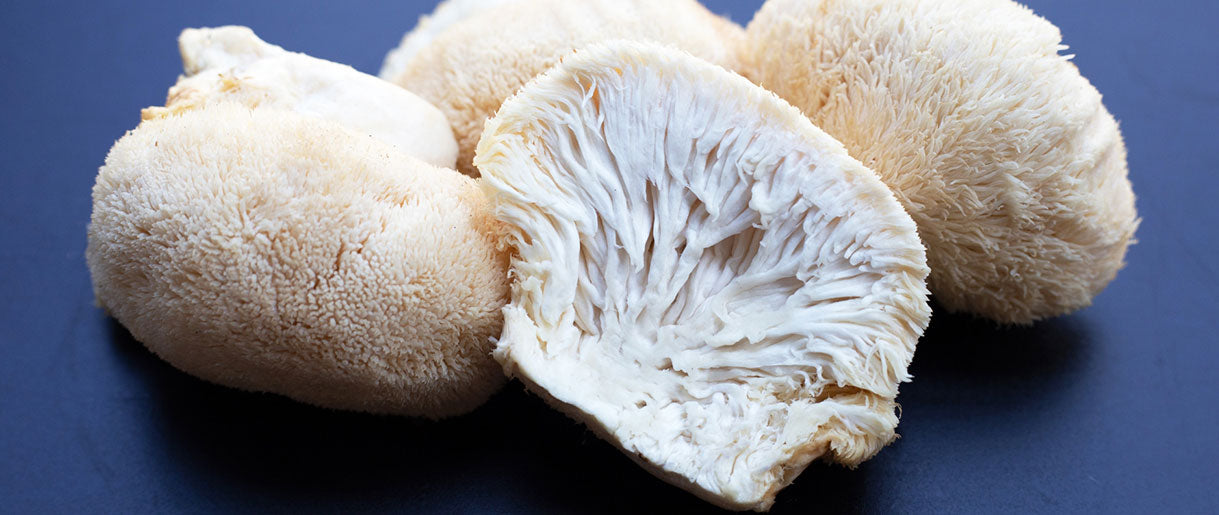
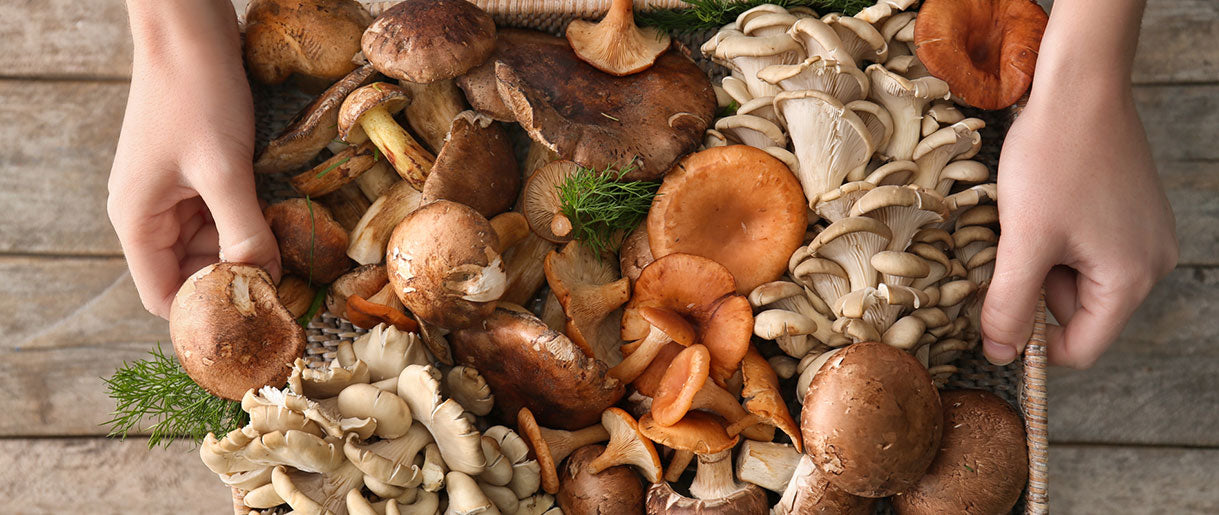
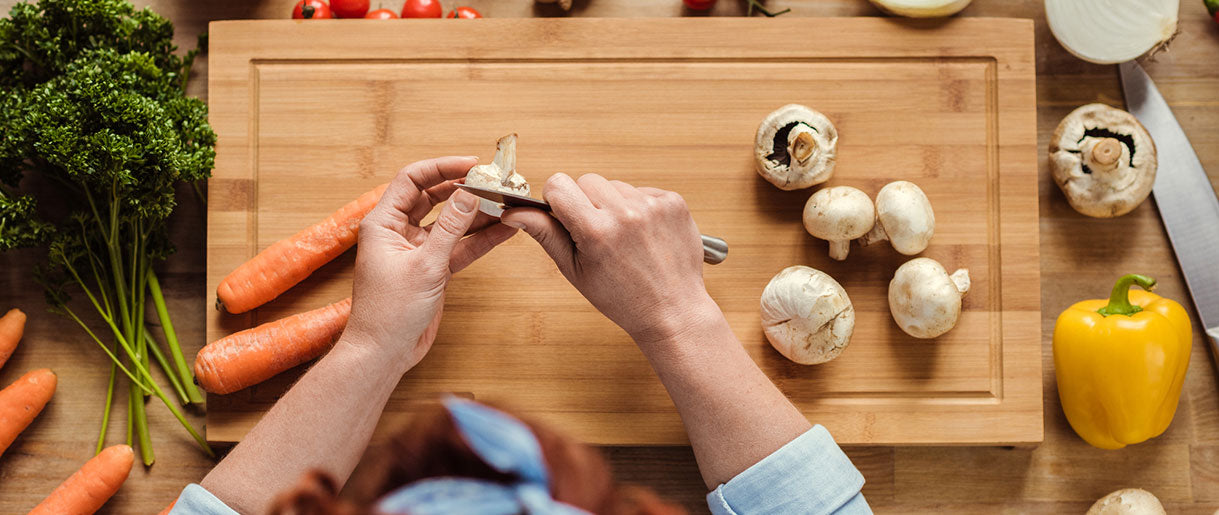
Let Us Know Your Comments